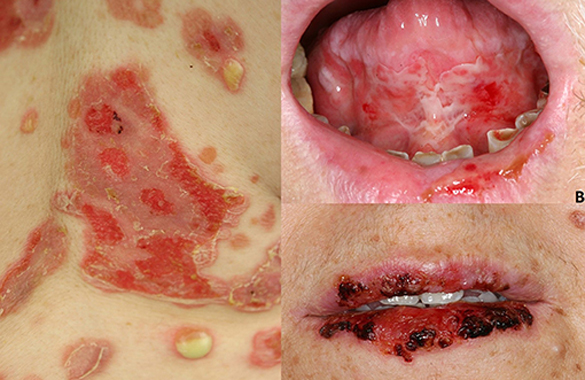

DermaSure Skin and Hair Clinic is a trusted and famous skin clinic for the best Pemphigus vulgaris treatment in Delhi. With a group of experienced skin specialists and a patient-focused approach, DermaSure means to assist people with dealing with their condition and recapture command over their skin wellbeing.

Pemphigus is a group of rare autoimmune disorders characterised by the formation of blistering lesions on the skin and mucous membranes. It can cause significant discomfort, pain, and impairment of daily activities. It typically requires ongoing medical management and treatment to control symptoms and achieve remission.
Signs and symptoms can show up quickly. Blisters can appear suddenly and spread. Widespread pemphigus can be life threatening. It can turn an otherwise healthy person into one who is extremely sick, incredibly tired, and in pain.
Here are the causes of pemphigus in bullet points:
Autoimmune Disorder: Pemphigus is primarily caused by an autoimmune response where the body’s immune system attacks healthy skin cells.
Genetic Factors: A family background of immune system illnesses might expand the gamble of creating pemphigus.
Environmental Factors: Environmental factors, such as medications can trigger the condition.
Infections: Some infections may trigger pemphigus in susceptible individuals.
Stress: Physical or emotional stress can trigger pemphigus patients.
Exposure to ultraviolet (UV): Too much sun exposure can potentially worsen the condition in some patients.
Effective Solutions for Pemphigus at DermaSure
Living with pemphigus can be bothersome. It can take a toll on an individual’s life, both physically and emotionally. The painful blisters and sores can cause discomfort, disrupt daily activities, and even affect self-esteem. Addressing pemphigus is crucial to improve quality of life and prevent further complications.
Diagnosis
The diagnosis of pemphigus involves a comprehensive evaluation by a dermatologist or specialist in autoimmune disorders. The process typically includes the following steps:
Medical History
Information about your symptoms, their duration, and any potential triggers or family history of autoimmune disorders is taken into account.
Physical Examination
A thorough examination of the skin and mucous membranes is conducted to assess the presence of blistering lesions, their characteristics, and their distribution.
Biopsy
A small sample of skin tissue (biopsy) will be taken from a blister or affected area to look for characteristic changes in the skin layers and the presence of immune cells.
Immunofluorescence Testing
A sample of the skin biopsy is treated with fluorescent dyes that detect the presence of antibodies and immune proteins. This helps confirm the autoimmune nature of the condition.
Blood Tests
Conducted to measure the levels of specific antibodies in the blood, such as anti-desmoglein antibodies, which are commonly associated with pemphigus.
Accurate diagnosis is essential for appropriate management and treatment of pemphigus. At DermaSure Skin & Hair Clinic, your treatment is guided by one of the best dermatologists in Delhi and we address pemphigus through a comprehensive and personalised treatment plan.
Common treatments for curing pemphigus:
Corticosteroid
If you have mild pemphigus, a corticosteroid may be recommended. Many people need stronger medicines like prednisone or methylprednisolone. These corticosteroids work throughout the body. A corticosteroid can clear the blisters and sores.
Immunosuppressant medication
This medication quiets (or suppresses) the immune system. Either azathioprine or mycophenolate mofetil is often used to treat pemphigus. These can stop the body from creating new blisters.
Biological agents
Rituximab is a FDA approved drug for the treatment of pemphigus which is now being used as a first line agent in its treatment. It is given intravenously as 2 doses of 1 gm each at a gap of 15 days.
Antibiotics, antivirals, and antifungals
If you have an infection, this type of medicine will be part of your treatment plan.
Wound care
Your dermatologist may include baths and wound dressings in your treatment plan. This can help heal blisters and sores.
Don’t let Pemphigus plague you – consult the top dermatology centre in Delhi/NCR, At DermaSure, we are committed to helping you manage pemphigus and reclaim confidence in your skin health.
Accurate Diagnosis: Extensive evaluations to accurately identify the particular sort of type of pemphigus and its seriousness precisely.
Successful Administration Options: Access to different medicines, including immunosuppressants and corticosteroids, for side effect management.
Comprehensive Care: Accentuation on both physical and close to home parts of treatment, offering help for general prosperity.
Affordability: Serious estimating that makes excellent treatment available to additional people.
After receiving treatment at Dermasure, patients frequently experience a huge decrease in side effects, with quicker healing of blisters and further developed skin wellbeing. Visit Dermasure skin and hair clinic for the best Pemphigus treatment in Delhi.
While there is currently no known cure for pemphigus, with appropriate treatment and management, many individuals with pemphigus can achieve remission and control the symptoms effectively. It is crucial to work closely with healthcare professionals to develop a personalised treatment plan.
Common symptoms of pemphigus include painful blisters and erosions on the skin and mucous membranes, often accompanied by itching, burning, and discomfort. The blisters are fragile and can rupture easily.
Treatment for pemphigus aims to suppress the autoimmune response and manage symptoms. It typically involves the use of systemic corticosteroids, immunosuppressive medications, and sometimes intravenous immunoglobulins. Close monitoring and regular follow-ups with a dermatologist or specialist are important for effective management of the condition.
Pemphigus is an immune system clutter. Ordinarily, your immune system produces antibodies to battle off hurtful intruders, such infections and microbes. But in pemphigus, the body produces antibodies that harm cells of your skin and mucous films. Pemphigus isn’t infectious.
Leave Them To #1 Skin & Hair Specialist In Delhi